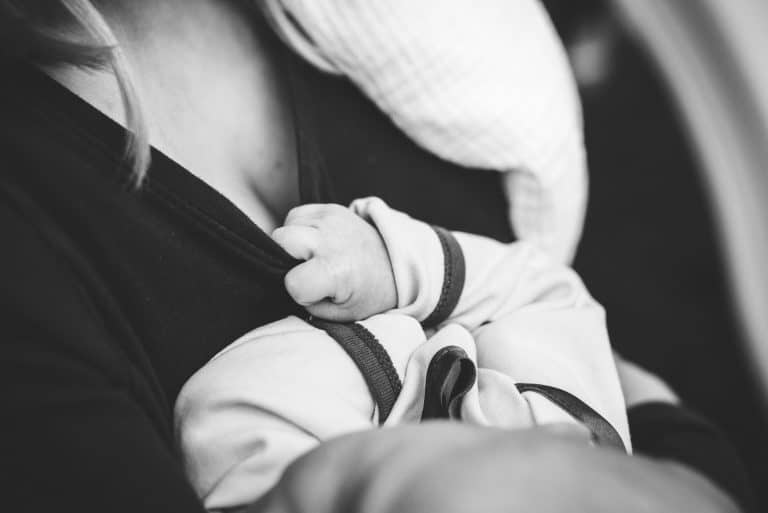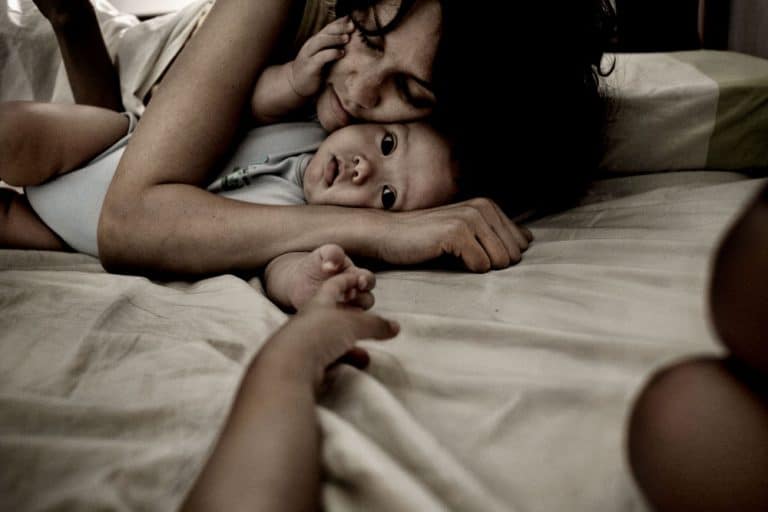
Image by Jordan Whitt/Unsplash.
Goodbye, Breastfeeding
I didn’t know the last time was the last time.
I was sitting on my friend’s couch, watching as her baby tried to build something out of Magna-Tiles, and my daughter Stella — inching towards two years old and feeling hungry — started tugging on my shirt. Without thought, just muscle memory and instinct, I pulled my shirt up, bra down, and nursed her while I continued chatting.
That night, when my husband John got home from a lot of travel he said, “I really miss my girls. I want to put Stella to bed every night this week.” After giving her a warm bottle of cow’s milk, he came down with a broad, effervescent smile on his face. “That’s the best thing in the world,” he said.
The next morning our routine was a little wonky and so we forgot to nurse. And then that night I realized we could just ride the wave of bottle-feeding and a remixed morning routine. After five years of being either pregnant or nursing, I could be done. I could send the signal to my miraculously calibrated breast (yup, just one hung in for the long haul) that it could stop producing milk. Reclaim my body for myself.
When people talk about breastfeeding in public, it’s usually politicized — charged with judgment and shame and science about what women are doing or not doing for their babies. Screw that. Becoming a mother is a profound and very personal transformation. Every woman must navigate it in a way that honors her own wisdom about her mental and physical health and that of her child.
I breastfed. It worked for me. It allowed me to read voraciously on my Kindle when the babies were really tiny and nursing was a full-time job. It gave me some respite on airplane flights. I even mastered nursing in my Ergo carrier so I could slip into the back of conferences where people like to pretend children don’t exist and still listen to panels that interested me, while keeping my baby quiet. In those moments, I felt like a maternal MacGyver.
Sometimes it didn’t work for me. I remember one specific night when I had the chance to have dinner with two of my favorite humans on this great green earth and my daughter wouldn’t go to sleep and refused to be soothed by my husband. All she wanted was the breast. I sat in the room, rocking gently as I nursed her and tears ran down my face. I was so frustrated, so alone. I was dumbfounded at how this little being had so much power over me. My life was unrecognizable in many ways, which wasn’t just about the breastfeeding, but it wasn’t not about the breastfeeding.
In my otherwise highly modernized life — where I’m yelling at Google to play Leon Bridges while I make breakfast and driving a hybrid car and texting pictures of the kids to my parents so many miles away — breastfeeding felt like a return to something primordial. Sure, there are pumps and nipple shields and organic creams, various technological accoutrements that surround the act. But the act itself is profoundly and unchangeably animalistic. My unnamed, 30-second-old daughter literally wriggled her way to my nipple the moment she was laid on my stomach and started nursing. Her body was way smarter than mine — this tiny creature with an intelligence for survival and connection transcended my multiple degrees and 32 years of living. Her body taught mine. After ten days of excruciating nipple pain, and a bout of mastitis, my body remembered that it was creature, too. It got easier. It got normal, even.
But also never really normal. I found nursing to be this weird litmus test of my comfort with my friends and family; I was generally pretty unabashed for both the sake of convenience and because I fancied it a bit of a public service to other mothers who might feel isolated or embarrassed. But when I was sitting with someone and hesitated to nurse my baby, I’d realize there was some unconscious block there — a part of me that didn’t feel like I could show up as my whole self with them.
The anatomical awe of it never completely wore off either. I would have these moments of floating outside of myself looking down and thinking:
“I am nursing this baby. Milk that my body is somehow producing is her sole source of nutrients, the only way she is staying alive and growing. WTF?”
I did it for over five years, with a little pregnant break, and it still baffles me. It still seems like magic, the weirdest, most wild trick that humanity plays (other than the whole growing and birthing a new human through your body thing).
I’m sad it’s over in certain ways. I gave Stella her very first bottle yesterday, and it was sweet, but not nearly as sweet as nursing. When I was nursing, I felt reassured that she was getting enough nutrients even when I was a totally lazy mom and fed her carbs all day. Likewise, I liked the idea that she was getting antibodies that might help her fight off all the preschool germs that float through our house.
And in other ways, I’m ecstatic. I’m curious to see what it feels like to be a mom with a body that no one lays claim to in this particular way. I’m so looking forward to traveling without, for even one second, thinking about pumping — no sitting on the floor of dirty bathroom stalls, no panicked hardening in my chest, no waiting patiently while the security guy, forcing a wincing smile, sticks a test strip in every one of my bottles of milk. I get to be a sexual being again with no caveats. I get to share caregiving without the complexity of this foundational, physiological difference.
Towards the end of my tenure, I started a little ritual of running through my prayers in my head when I would nurse Stella to sleep at night. Sometimes, Maya, Stella’s 4-year-old sister, would ask if she could help put her to bed. Perched on the armrest of our big yellow chair, she would rub Stella’s head and tell her reassuring things about how much we love her and how cute she is. Inexplicably and also sort of perfectly, she calls Stella “booty snacks,” so there were many freestyle lullabies integrating the nickname. Sometimes I would say my prayers out loud, thinking that maybe Maya would like to hear them. She seemed to enjoy it — being let in on this little piece of sacred, everyday intimacy.
She has no memory of nursing, herself. I know, in short order, I will have little memory of nursing either of them. We are three different bodies now, orbiting one another, colliding sometimes, but not blending the borders anymore. And after all the politics and the pumping and the frustration and the sweetness of all of these years, I’m left with an unshakeable awe for these bodies, for all bodies. Not all mother can or choose to breastfeed their babies, not all mothers have carried their babies, but we all know the power of corporeal connection. Despite all we do to seem civilized and independent, what miraculous, intertwined creatures we all are.

